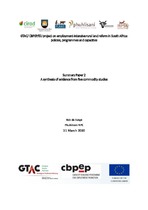| dc.contributor.author | de Satgé, Rick | |
| dc.contributor.author | Phuhlisani, NPC | |
| dc.date.accessioned | 2020-06-19T07:48:28Z | |
| dc.date.available | 2020-06-19T07:48:28Z | |
| dc.date.issued | 2020-03-31 | |
| dc.identifier.citation | de Satgé, R., Phuhlisani, NPC. 2020. A synthesis of evidence from five commodity studies | en_US |
| dc.identifier.uri | http://hdl.handle.net/10566/5228 | |
| dc.description.abstract | This is the second of three papers which draw together and summarise the key findings from the extensive research conducted as part of a project to develop a draft policy framework for employment-intensive land reform. The project has been managed by the Institute for Poverty Land and Agrarian Studies (PLAAS) in association with Phuhlisani NPC. It has been funded under the auspices of the Capacity Building Programme for Employment Promotion (CBPEP) managed by the Government Technical Advisory Centre (GTAC) with support of the delegation of the European Union to South Africa.
This paper summarises the findings from five commodity studies selected for their potential to promote employment intensive land reform and sustainable livelihood opportunities. The five commodities are:
• livestock;
• wool;
• fresh vegetables;
• subtropical fruit;
• sugarcane. | en_US |
| dc.language.iso | en | en_US |
| dc.publisher | GTAC | en_US |
| dc.subject | Employment-intensive | en_US |
| dc.subject | South Africa | en_US |
| dc.subject | Commercial livestock farmers | en_US |
| dc.title | A synthesis of evidence from five commodity studies | en_US |
| dc.type | Other | en_US |

